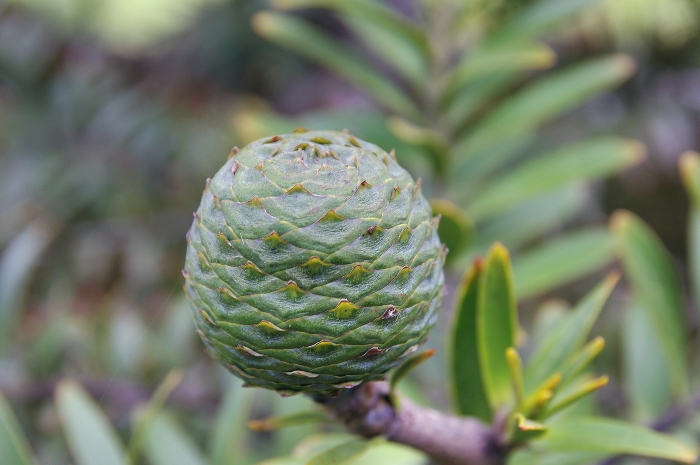Kauri
(Agathis australis)
Kauri (Agathis australis)
/
/

Jan Helebrant
CC0 1.0 Universal
Image By:
Jan Helebrant
Recorded By:
Copyright:
CC0 1.0 Universal
Copyright Notice:
Photo by: Jan Helebrant | License Type: CC0 1.0 Universal | License URL: https://creativecommons.org/licenses/by-sa/2.0/ | Uploader: Juhele_CZ | Publisher: Flickr |












































































Estimated Native Range
Summary
Agathis australis, commonly known as Kauri, is an evergreen tree native to the North Island of New Zealand, where it thrives in subtropical forests. It is renowned for its longevity and is one of the most massive trees by volume in New Zealand, though not the tallest. Mature Kauri trees can reach heights of 40 to 50 meters, with imposing trunks exceeding 5 meters in diameter, rivaling the size of Californian sequoias. The tree’s form evolves from a narrow cone in youth, with branches along the trunk, to a majestic crown in maturity after shedding its lower branches. This adaptation prevents vines from climbing and competing for sunlight. The smooth, light-grey bark peels away in flakes, providing a defense against parasitic plants and accumulating at the base of the trunk, sometimes piling up to 2 meters high. The small, narrow leaves contribute to the tree’s overall elegant appearance.
Kauri trees are valued for their timber and resin and are often cultivated for their historical and cultural significance. They are also appreciated for their stately presence in large gardens and parks. In cultivation, Kauri trees require full sun to part shade, consistent moisture, and well-drained soils to thrive. They are slow-growing but can live for thousands of years, making them a long-term investment for any landscape. Gardeners should be aware of their potential size and provide ample space for growth. Kauri trees are susceptible to kauri dieback, a soil-borne disease caused by the pathogen Phytophthora agathidicida, which is a significant threat to their survival.CC BY-SA 4.0
Kauri trees are valued for their timber and resin and are often cultivated for their historical and cultural significance. They are also appreciated for their stately presence in large gardens and parks. In cultivation, Kauri trees require full sun to part shade, consistent moisture, and well-drained soils to thrive. They are slow-growing but can live for thousands of years, making them a long-term investment for any landscape. Gardeners should be aware of their potential size and provide ample space for growth. Kauri trees are susceptible to kauri dieback, a soil-borne disease caused by the pathogen Phytophthora agathidicida, which is a significant threat to their survival.CC BY-SA 4.0
Plant Description
- Plant Type: Tree
- Height: 75-100 feet
- Width: 65-80 feet
- Growth Rate: Slow
- Flower Color: N/A
- Flowering Season: Non-Flowering
- Leaf Retention: Evergreen
Growth Requirements
- Sun: Full Sun, Part Shade
- Water: Medium
- Drainage: Fast
Common Uses
Low Maintenance
Natural Habitat
Subtropical forests of the North Island of New Zealand
Other Names
Common Names: Kauri Pine, Kaurifichte, Pino Kauri, Агатис Новозеландский, 新西兰贝壳杉 (Xin Xi Lan Bei Ke Shan)
Scientific Names: , Agathis australis, Dammara australis, Dammara australis var. glauca, Dammara purpurascens, Podocarpus zamiifolius, Salisburyodendron australe, Salisburyodendron australis,
GBIF Accepted Name: Agathis australis (D.Don) Lindl.